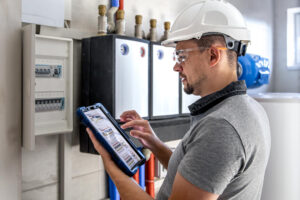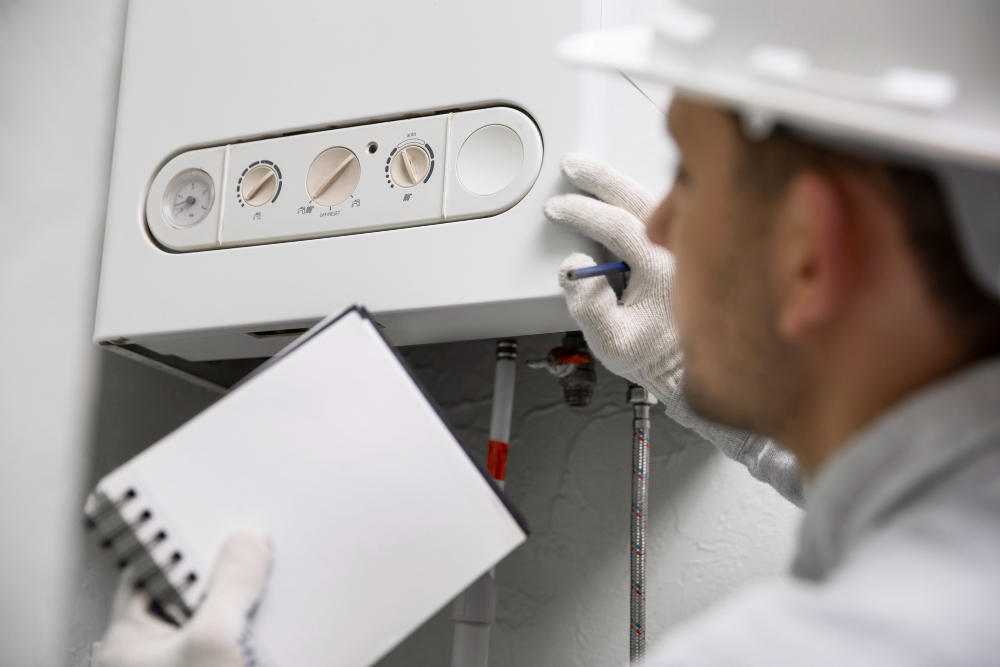Electric boilers in Glasgow represent one of the most promising approaches for mitigating greenhouse gas (GHG) emissions, as most industries currently rely on fossil fuels as primary energy sources.
Electric boilers do not produce emissions, while combustion boilers do. Furthermore, electric boilers tend to be more energy-efficient.
Note, however, that electricity production leaves its own carbon footprint, meaning electric heating won’t always be 100% eco-friendly.

They don’t produce any emissions.
An electric boiler’s primary advantage lies in its emission-free nature. While electricity does contain fossil fuels, its environmental footprint is considerably less polluting than gas boilers, which produce carbon monoxide and other toxic gases that can be deadly. Furthermore, electric boilers are simple to install without needing flues or tanks, meaning they can fit virtually anywhere within your home.
Electric boilers in Glasgow can also work seamlessly with solar panels to generate and store their own energy directly, thus cutting energy bills directly. Storage batteries allow even greater environmental friendliness. Plus, they’re more convenient than gas boilers because there’s no need to locate them near an outlet, meaning you could still use one even without electricity available!
Electric boilers have grown increasingly popular as more nations move towards becoming ossil-fuel-free. Denmark, for instance, has adopted electric boilers as part of its plan to decarbonise its heating network using renewable wind power as an electricity source. Although it is not yet possible to get 100% emission-free electric boilers, these appliances tend to be more energy efficient and quiet than gas models, saving both resources and noise pollution!
Electric boilers provide many environmental advantages, including reduced capital, maintenance, and operating costs, as well as a smaller physical footprint. Unfortunately, due to high energy prices, industrial plants find it challenging to switch entirely to electric steam production.
In this study, we investigate the potential of electrifying industrial boilers to lower electricity costs and greenhouse gas emissions by electrifying locations and industries where fossil fuel prices are high. Three scenarios are taken into consideration: 1) a hybrid system with renewables; 2) a fully electric grid providing low-carbon electricity; and 3) an accelerated replacement of conventional boilers by all-electric systems.
Our analysis shows that industrial plants can make significant emission savings by electrifying their boilers. This can be done by using waste heat, adding an economizer, or switching entirely to electric systems, with savings likely increasing with declining electricity costs from renewable sources.
They are compatible with solar panels.
Glasgow electric boilers can be an excellent way to reduce carbon emissions. Used together with solar panels, electric boilers can make systems more energy-efficient and environmentally friendly, helping homeowners lower energy costs and even get paid back for generating electricity themselves. But before making your choice, keep some key considerations in mind before purchasing an electric boiler for your home.
Electric boilers utilise power directly from the grid to heat water, which makes them an attractive option for areas with stringent emission regulations and no exhaust output, such as low pollution zones. Furthermore, electric boilers tend to be more cost-effective and affordable to run than their gas counterparts.
Electric boilers are not only more eco-friendly; they can also be combined with solar panel systems to generate free energy for the home. This solution is an excellent way to cut energy costs and decrease fossil fuel usage reliance, plus these systems can easily be installed on rooftops for ease of maintenance!
Electric boilers feature fewer moving parts than their gas-burning counterparts, making them less likely to breakdown or require maintenance. Plus, these quieter options can easily integrate into existing heating systems.
An electric boiler compatible with solar energy production and a battery storage system can store excess solar energy produced during sunny days to be used at night or in cloudy times, significantly lowering both your energy costs and carbon emissions. You may even qualify for financial incentives when installing these systems!
The number of solar panels needed for an electric boiler depends on both your home’s size and energy use, as well as what kind of survey will be conducted prior to its installation to determine its most ideal location and size, thus helping us calculate its cost.
They are cheaper to run.
Electric boilers are much less costly to run than gas ones because they consume significantly less energy and produce far fewer emissions, benefiting both your wallet and the environment. Plus, you can combine electric boilers with eco-friendly electricity generation, such as solar panels, to save even more on energy bills!
Electric boilers work by using electrical current to heat heating elements within the boiler, then pumping hot water around your home. As they don’t burn fuel, electric boilers are generally quieter than their gas counterparts and can be placed anywhere without being disruptive; furthermore, as they don’t require a flue for use, they can also be placed closer to points of use within your house.
Electric boilers use less energy to heat water for your home than gas ones do, with lower maximum output capacities that may struggle to meet larger homes’ heating and hot water demands; however, these boilers make an ideal option for smaller properties.
Notably, electricity can still be produced using fossil fuels; thus, electric boilers receive a D rating for ErP efficiency. As renewable energy becomes more popular in the UK, their ratings could change accordingly and eventually result in even greater efficiencies for electric boilers.
Electric boilers offer many advantages over gas-powered models. One such benefit is that they do not produce combustion fumes like carbon monoxide that could potentially leak from gas boilers and cause poisoning in your home, making it safer for households with children or elderly people living there. Furthermore, these electric units don’t need an annual safety certificate like their gas counterparts do, so landlords won’t have to pay this service fee either. Lastly, due to having few moving parts, an electric boiler typically won’t break down often and won’t need servicing regularly, although an extended warranty can provide peace of mind when making investments like this one.
They are silent.
Electric boilers are exceptionally quiet when operating, making them an excellent option for homes where space or noise restrictions exist. Furthermore, there’s no flue or fuel tank required, and installation can occur anywhere within your house—ideal if listed buildings prevent gas boiler installation.
Electric boilers are also safer, not emitting any fumes or carbon monoxide, making them the ideal choice for people who suffer from chemical sensitivities or have allergies to gas-derived chemicals. Furthermore, electric models tend to leak less often and therefore pose fewer safety concerns compared to their gas counterparts; in addition, there’s no regular maintenance needed, and they’re generally more reliable overall than their gas counterparts.
Electric boilers offer another benefit in that they’re compatible with solar panels. Some even allow users to harness free solar energy during the day and store it in an immersion heater for later use at night, helping reduce electricity bills significantly!
Electric boilers may also be more energy-efficient than their gas counterparts, as they don’t emit emissions or fumes that might disturb you during sleep or work. Furthermore, these devices don’t produce carbon monoxide, an odourless and colourless gas that can be fatal, unlike gas alternatives, which do.
Electric boilers are extremely straightforward to install. Their compact size means less space is taken up by installation, and without needing a flue or fuel tank, electrics take up even less. Furthermore, their installation costs tend to be cheaper too, making them perfect for older homes or newly built properties needing to meet strict energy efficiency regulations. You may even find some that meet ErP A standards—these utilise renewable energy sources more than traditional gas boilers! However, not all types of electric boilers offer these benefits, so it is wise to compare different options before choosing what’s right for your home.


